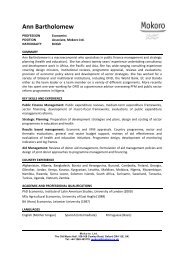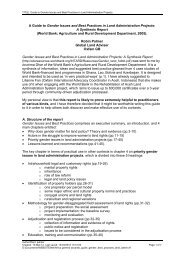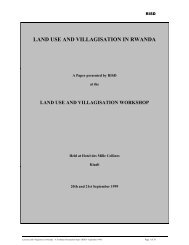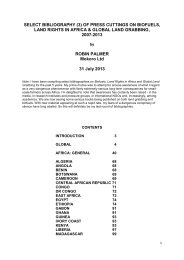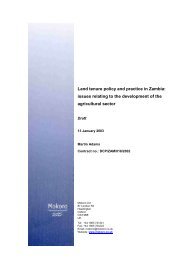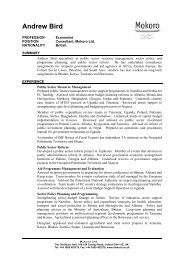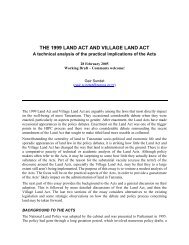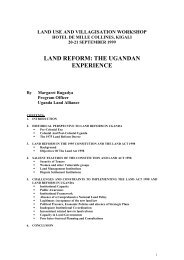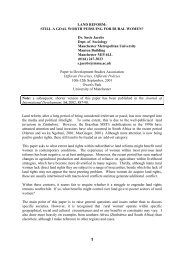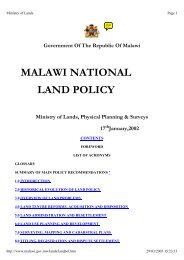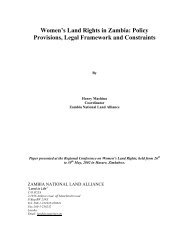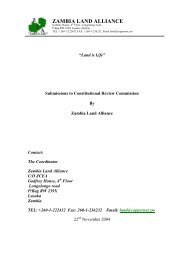Download - Mokoro
Download - Mokoro
Download - Mokoro
- No tags were found...
You also want an ePaper? Increase the reach of your titles
YUMPU automatically turns print PDFs into web optimized ePapers that Google loves.
36Box 5: Co-operative processing by woolgrowersAn initiative by the National Wool Growers’ Association (NWGA) to support sheepfarmers in communal areas, particularly in the former Transkei areas of the EasternCape, has had a significant impact on the quality of wool produced and increasedincomes. Wool farmers here, operating individually, had struggled to expand theirproduction in under-serviced areas where they lacked facilities and where a few localtraders were able to drive down prices – effectively fixing prices. From the mid-1990s,the NWGA spearheaded a process to build shearing sheds for farmers to shear, sort,grade and pack their wool. It also provided training in shearing, sorting, grading andlivestock and pasture management, and arranged the distribution of 2,800 high qualityrams at reduced prices. The central innovation, however, was the formation of farmerassociations that would jointly operate these sheds, share transport costs, and markettheir produce together. By processing their wool and marketing in bulk, they were able tobypass local traders, sell at auctions, and access higher prices per kilogram of wool – upto double the prices they had previously received – and reinvest some of the additionalincome in expanding production. This has contributed to an estimated five-fold increasein the value of wool produced by the affected communities; 12% of national woolproduction now comes from shearing sheds in the communal areas of the Eastern Cape.The NWGA provided the capital required and implementation relied on seconded stafffrom the Department of Agriculture. Although production is not collective, cooperation inthe initial stages of value adding and processing (where there are economies of scale)has strengthened the bargaining power and market access of small farmers. Althoughthe initiative was limited in its reach, the NWGA is now using mobile shearing tents as alower-cost option to extend this approach to more sheep farmers in the Eastern Cape.Source: Kleinbooi 2007cRecently government has recognised the need for land acquisition, settlement supportand production support to be integrated and delivered in a coherent manner. Up untilnow, acquisition of land through LRAD, for instance, has been disconnected fromprovision of support through CASP – though applicants may apply for both, thesesystems have not been connected, meaning that people getting land may or may notreceive support through CASP, and if they do, the timing may not be aligned. Thisfragmented approach, delivered through different institutions and application processes,with different planning and priority frameworks and budgeting systems, is now a centralchallenge.A proposed Special Purpose Vehicle (SPV) would be a land acquisition andmanagement agency with private sector partnership, to source and disburse fundingfrom different institutions, for land acquisition and production support, and to sourceprivate service providers. First, it would conclude service-level agreements with privatesector partners to becoming implementing agents on behalf of the state. Second, itwould acquire land proactively (ie. not necessarily for identified beneficiaries), plan for itsuse, and dispose of it (ie. a double transfer). The foundational approach privilegescommercial farming as the intended outcome of support services: “the one-stop shop willensure progression from family farmers to commercial farming” (Xingwana 2007:5). TheSPV concept has been described by the Minister as:a ‘one-stop shop’ for all land and agricultural support services for landreform beneficiaries. It will co-ordinate settlement support throughout thePolicy Options for Land and Agrarian ReformProgramme for Land and Agrarian Studies, University of the Western Cape



